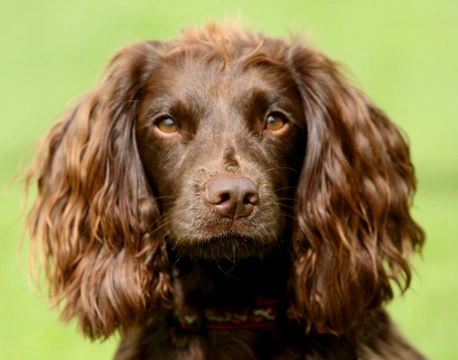
Ownership considerations for the field spaniel
The field spaniel is a handsome, medium sized dog from the spaniel grouping, which was originally bred for an all-black coat when they were first established in the late 19th century, but can now be seen in either black, liver or roan, generally solid coloured but occasionally with points or ticking.
Their coats are darker and deeper in colour than most other spaniel breeds, and they do not have an undercoat, but the top coat is long and silky. While most spaniel’s breed history is as working dogs, the field spaniel, despite their rather misleading name, was widely produced as a show dog first and foremost, and while they can now fulfil various working roles, are most widely owned as pets. Later, the breed was developed as a slightly taller, more long legged dog, which is better suited to field work than the original dogs of the breed.
Their size falls roughly between that of the English springer spaniel and the English cocker spaniel, standing up to 18” tall at the withers and weighing up to 55lb.
The field spaniel is one of the British dog breeds that are classed as a vulnerable native breed by the UK Kennel Club, meaning that less than 300 new puppies of the breed on average are registered with The Kennel Club each year. This makes the breed rather rare, but The Kennel Club and other breed organisations are working hard to raise the profile of the field spaniel, and increase interest in their ownership.
If you are wondering if a field spaniel would be a good choice of dog for you, in this article we will look at their temperaments and personalities in more detail, in order to help you to make a decision.
Read on to learn more.
What are their temperaments like?
The field spaniel makes for a good all round family dog, providing that they have a job to do or something to keep them occupied! They are adaptable dogs that are good all-rounders, and are well suited to canine sports such as dog agility or obedience.
They are lively, bright and fun loving dogs, which are personable with both friends and strangers, and that get on well with children. They do get bored easily if left alone with nothing to entertain themselves with, and can become destructive without adequate stimulation.
They are patient, quiet dogs within the home, which like to be in the company of their owners, and that enjoy meeting new people as well.
How much exercise do they need?
Like all spaniel breeds with a working history, the field spaniel likes to be outside and run around, and as such, they need to spend plenty of time every day out on walks and playing. They enjoy mental as well as physical exercise, and games that get them thinking and keep their attention are the best fit for the breed.
Are they easy to train?
The field spaniel is ranked as having above average intelligence in canine terms, making them capable of learning a wide range of commands, and retaining the ability to learn new skills throughout their lives. They try hard to please and look to their handlers for direction, but soon become bored with overly repetitive training. They like to exercise their minds and bodies together, so keeping training positive, varied, upbeat and fun is the best way to successfully train the field spaniel.
Are they good with other animals?
Field spaniels are generally very personable dogs that are happy to live with others, or to meet other dogs when out and about. They enjoy playing and exploring with other dogs, and usually are open, friendly and well behaved with others.
The field spaniel can be trained with relative ease to live alongside of a cat providing that they are introduced when the dog is young, and they are often affectionate and loving with cats that form part of their family.
What sort of homes do they suit?
The field spaniel has a good reputation for being tolerant and patient with children of all ages, and they can live quite happily within a family home with other animals or children of any age. They like to play and cuddle up with their families and are loving, affectionate and loyal.
They do get bored easily if they do not have enough stimulation, and thrive on having a role to fulfil or a job to do, and enjoy learning new skills both inside and outside of the home. While they can be left alone for a couple of hours at a time, they are not well suited to spending long periods of time on their own, and may become unhappy or destructive if forced to do so.
They are happiest in active, fit families that like to spend plenty of time outdoors, playing with and walking the dog, and generally involving them in family life.



